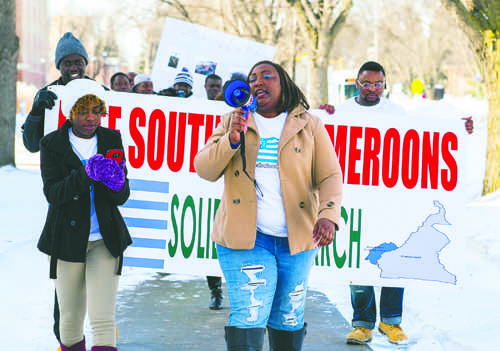March in solidarity with Cameroon

Elizabeth Nfor (center) leads students in a solidarity march on campus for Cameroon on Friday afternoon. Nick Nelson / Dakota Studenr
February 14, 2017
On Friday Feb. 10, a group of UND students and Grand Forks community members gathered outside of the Gorecki Alumni Center to advocate for equal civil rights for all people in Cameroon and a change in the federal system which will guarantee equal protection for the English speaking minority.
Wearing #freesoutherncameroon t-shirts, they marched down University Avenue chanting, “Go down, go down, go down to Yaounde. And tell Biya, Biya let my people go.”
Southern Cameroonians believe their President, Paul Biya, is a dictator who does not have their best interests in heart.
“Today we have an 84 year-old dictator running a banana republic,” Evans Akah said.
Before gaining independence in 1961, Cameroon was divided into two colonies, the French speaking Republic of Cameroon and the English speaking Southern Cameroon. Southern Cameroon agreed to independence from the colonial powers of France and Great Britain by joining with the Republic of Cameroon.
For decades now, the English speaking minority has been saying that the French-speaking government of Cameroon has been trampling on their rights, whether it be worker discrimination or an attempt to eliminate English being taught in schools.
“Today, (Southern Cameroonians) have no benefits in this union, they are marginalized, they are used as slaves, they live as if they are foreigners without any advantages,” Moses Oteh said.
The English speaking parts of Cameroon have been protesting against the French central government for months now in hope of gaining their own independence or demanding a federal change. The protests have caused deaths and hundreds of arrests. Lawyers and university professors in Cameroon have aided students in their protests.
“The people of Southern Cameroon took to the streets to demonstrate to the government that they are unsatisfied with with the way things are going,” Akah said.
“The government, instead of listening and putting in place efforts to resolve this problem intellectually, they went after the people,” Akah said. “As we are speaking, there is blood on the streets, girls are being raped in universities and people are being arrested in Southern Cameroon. There’s a lot of torture and there’s a lot of killing.”
As a response to escalating tensions, the government has now started punishing social media users for posts the government deems is irresponsible. Additionally, no money can be exchanged between online in Cameroon.
Akah believes strongly in Southern Cameroon being able to gain independence.
“In a federal system, we will be in a better place to manage our resources, we control our destiny, we manage our judicial system, we manage our anglo-saxon identity and manage our school systems as well,” Akah said. “These are all fundamental things we can’t get in the Republic of Cameroon,” which is the Common Law system that Cameroon is currently operating under.
Nick Sallen is the editor-in-chief for the Dakota Student. He can be reached at [email protected]

